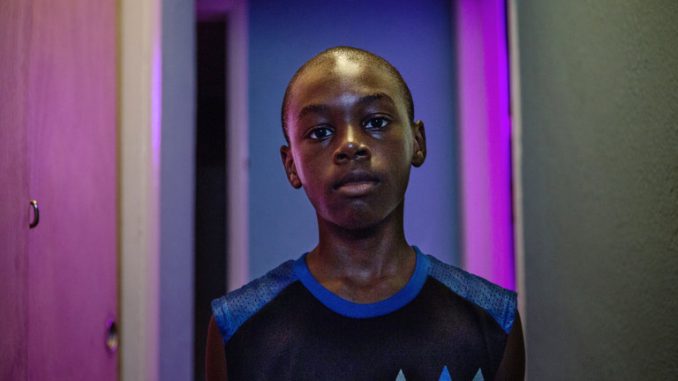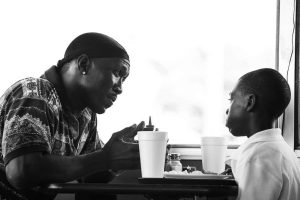
David Anderson, Staff Writer |
CAUTION: *Spoilers. Spoilers everywhere*
This past Sunday, “Moonlight” took home the Oscars for Best Picture, Best Supporting Actor, and Best Writing. Ironically, the most salient part of its film is its silence as the hostile circumstances of his upbringing render the main character, Chiron, incapable of taking ownership of his sexual identity until he is an adult.

But the film does not begin with Chiron. It begins with Juan, Chiron’s surrogate father, a neighborhood crack dealer (who is oddly enough, one of the most likeable characters in the film) as he discovers a young Chiron hiding in an abandoned apartment from a rabble of small boys who seek to do him bodily harm with rocks. Juan takes Chiron under his wing, feeds him, lets him sleep in his lavish home, and promptly returns him to his mother the following day. Chiron returns to Juan continuously and as they become closer, Juan briefly touches upon the themes of blackness and identity, assuring Chiron, “There are black folks everywhere, we were the first people on earth” and “At some point you gotta decide for yourself who you’re going to be. Can’t let nobody make that decision for you.”
The latter quote sets the precedent for the rest of the film as Chiron constantly grapples with his mother and peers dictating who he should be. The film itself parses Chiron’s life into three stages: his childhood, teenage years, and adulthood. Each is titled with a different name that someone has given him.
Throughout the first two sections of the film, the viewer never sees Chiron self-identifying as gay. Until the audience is shown an onscreen homosexual encounter roughly halfway through the second section of the film, the violence and harassment against Chiron seems excessively arbitrary. One assumes that Chiron must have said or done something off-screen that marked him to his peers as being homosexual and his resounding silence is the result of that harassment but the film differs from the usual homosexual coming-of-age story in that the violence and hatred targeted at Chiron’s homosexuality comes before an explicit self-referential moment by him. As a child, Chiron asks Juan what the word “faggot” means and in Chiron’s teenage years, he has a homosexual encounter with a childhood friend but in neither of these cases does Chiron ever claim his identity. Even in the case of Chiron’s encounter, the consent functions around nonverbal cues and afterwards, Chiron apologizes.
In the final section of the film, Chiron has grown into a pseudo-Juan; he deals crack, dresses the same, and drives the same car. After a call from the same friend who gave him his first sexual experience, the film culminates in Chiron’s returning home and, after lengthy, slow scenes of disjointed silence, Chiron confesses to his childhood friend that he has not had a sexual encounter since theirs. This confession marks the first time that Chiron has been able to identify himself explicitly as being homosexual with the implication being that he can now begin to live his life more authentically. However, this leaves much darker implications for the state of gay black youth. In Chiron, we see a man who has foregone any intimate relations (and would’ve continued to do so, had his friend not contacted him), because his childhood and adolescent environment was so toxic to his development.
The film is ambitious as it involves how blackness, masculinity, socioeconomic status, and sexuality function in one’s upbringing. While impeccable in its rendering of a young black man’s sexual development, it falls slightly flat in its dealings with blackness and poverty. Besides Juan’s initial comment, the topic of blackness is never again dealt with directly in the film, and while the viewer gets many poignant looks at the difficulties of poverty, neither of these topics are demonstrated explicitly as intersecting with Chiron’s homosexuality; they simply run parallel to his development throughout the movie. That being said, just as Chiron’s persistent silence is the cornerstone of “Moonlight’s” message about homosexuality, this similar silence in the rendering of blackness and socioeconomic status could be a subtler restatement of that same message.



Leave a Reply